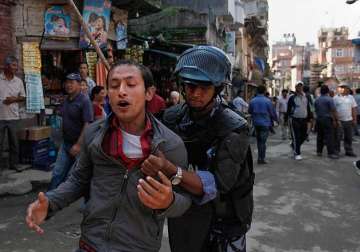Kathmandu, Nepal: Security was stepped up in Nepal on Sunday ahead of the proclamation of the Himalayan nation's new federal constitution following a decade of political infighting, with fresh threats and violence coming from smaller political parties and ethnic groups.
Thousands of officers were guarding the streets and checking passengers on highways, said police official Kamal Singh Bam. Police have responded to reports of bombs being found in Kathmandu but they all turned out to be a hoax.
A small protest of about 50 people in Kathmandu was quickly dispersed by police and two people were detained. Police were under orders to stop any protests.
Security was particularly high around the Constituent Assembly building in the capital, where President Ram Baran Yadav will officially proclaim the new constitution later on Sunday.
Opposition parties called a general strike to protest the constitution, but it had little effect on the traffic and markets remained open.
Schools and offices are closed because Sunday and Monday were declared a public holiday to celebrate the constitution, Nepal's first complete political framework since monarchy was abolished in 2006.
The key part of the charter, passed on Wednesday after a decade of bickering and violent protests, sets the country up as a secular federation of seven states, each with a legislature and chief minister.
However, some ethnic and religious groups say lawmakers ignored their concerns over how state borders should be defined. They want more states, including ethnically-based ones, bigger territory for larger groups and more seats for ethnic minorities in parliament and government.
Laxman Lal Karna, a senior leader of the Madhesi ethnic group in southern Nepal, said the new constitution failed to address many of the issues and that protests will continue.
The violence has left at least 44 people killed, including police, over the last several weeks.
"It was initially agreed by these big parties that there would be an autonomous Madhesi state with judiciary independence, but all that agreement has been crushed," Karna said.
The three main political parties backing the constitution have made a fresh appeal for Madhesi to join talks.
"They may disagree with the size and makeup of these provinces but that is not a really big issue," Prime Minister Sushil Koirala said Saturday.
There are more than 100 ethnic groups in Nepal and some want states named after them. These groups say the constitution still limits their representation. Though members of the parliament would be chosen through a proportional representation vote to ensure that minority groups are represented, the groups say the number needs to be increased.
The main parties say those issues can be fixed later.
"The constitution is not something that cannot be absolutely changed. It can always be amended later when needed," said Khadga Prasad Oli of the Communist Party of Nepal Unified Marxist Leninist.
Some among majority Hindus also believe the country's reference as a Hindu nation should have been restored in the constitution.
Latest World News
